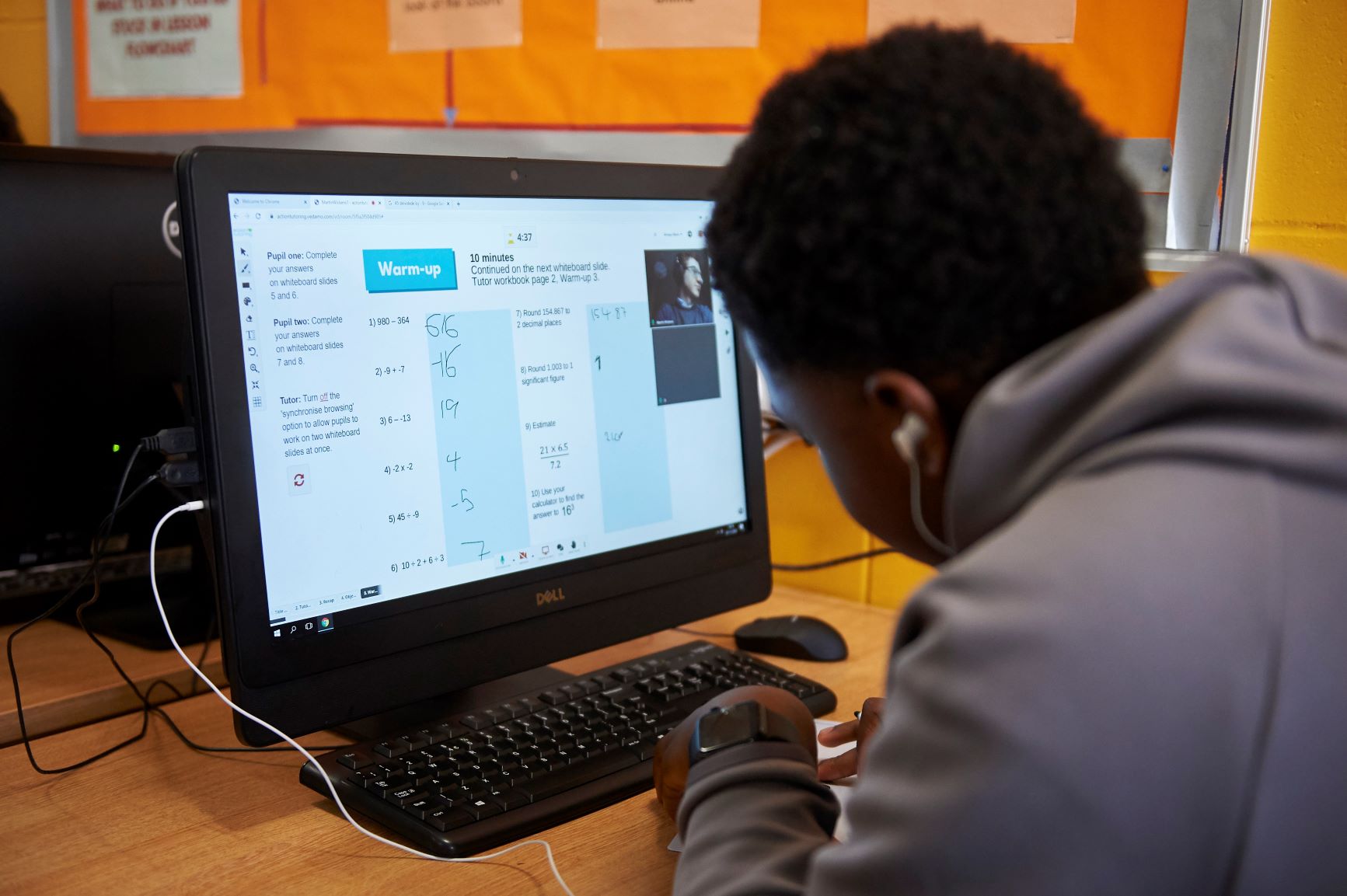While we hope to resume face-to-face tutoring soon after pupils return to school, the online offering will continue indefinitely.
If there’s one thing that the Covid-19 pandemic has highlighted around the world, it’s the importance and value of online learning. It has been a catalyst that has forced education to accelerate its embrace of technology, with millions of pupils across the country now in online classes. While there is hope to resume face-to-face tutoring soon after pupils return to school, online offerings have been so successful that some organisations say it will continue indefinitely.
The National Online Tutoring Pilot that took place over summer 2020, commissioned by the Education Endowment Foundation in partnership with the Sutton Trust, Impetus and Nesta, gave an opportunity for organisations to trial online learning for pupils based at home. Here, the EEF found that delivering online tuition can be an effective way to support the learning of disadvantaged pupils during partial school closures.
Delivering online tuition can be an effective way to support the learning of disadvantaged pupils.
While the government-funded National Tutoring Programme was set up in November 2020 to support disadvantaged pupils with tutoring sessions, many of its Tuition Partners, such as Action Tutoring, already had experience with online tutoring. From the summer pilot to running online sessions in schools from the beginning of this academic year, online tutoring had been thoroughly tested by the time the most recent school closures were announced.
As students return to school next week, Action Tutoring will continue to offer online tuition. However, pupils will now take part in the session while they are in school (as they were before the recent school closures), whereas tutors will be based remotely. While we also hope to resume face-to-face tutoring soon after pupils return to school, the online offering will continue indefinitely.
Online tutoring had been thoroughly tested by the time the most recent school closures were announced.
Switching to home-based learning
Action Tutoring pupils usually take part in the tutoring sessions from school, even if their tutor is joining remotely. As a Programme Coordinator for Action Tutoring, my colleagues and I have spent the last few months facilitating online tutoring sessions at primary and secondary schools across the country. I’ve sat back and watched with pride as my class of 20 pupils were glued to their screens, headphones on, focused on the maths and/or English tasks put in front of them by their tutors.
I’ve sat back and watched with pride as my class of 20 pupils were glued to their screens.
Although I did believe that pupils could learn through remote tutoring, it is not something that I ever experienced as a pupil, or led in my teaching career. Each session I oversaw gave me time to contemplate how we use online tools and technology for tutoring. Supporting pupils and helping them to familiarise themselves with our tutoring platform has been surprisingly easy – if there’s one aspect of life that today’s children thrive at compared to previous generations, it’s their adoption of technology.
If there’s one aspect of life that today’s children thrive at compared to previous generations, it’s their adoption of technology.
Yet, even with children and young people being more technologically savvy than previous generations, there is a difference between what devices are used, and how they are used. A mobile phone, for example, is great for a quick search to find facts and information, but might not be the best when it comes to interactive online learning. For that, a laptop, desktop or tablet is the most effective. Why? Because it allows us to utilise tools available to make it an effective online learning experience.
Coordinating online tutoring programmes has allowed me to reflect on the key elements that must be considered when delivering tutoring virtually.
Peer interactions can provide motivation and improve learning outcomes.
Key elements of online tutoring
- Resources: One of the benefits of working with Action Tutoring is the wide range of resources aimed at supporting our pupils with the key skills and topics required to excel in their SATS and GCSEs. As our volunteers come from a diverse array of professional backgrounds, this is important as it gives us the confidence that everything that is being taught by tutors is appropriate and helpful. Our physical workbooks have been converted into online PDF documents, making them easily accessible and easy to upload.
- Interactive whiteboards: In order to replicate a face-to-face tutoring session, where tutors and pupils are able to scribble down their ideas and answers on paper, an interactive whiteboard is key. Tutors and pupils are able to draw, add text, erase, and do anything else they would normally do on a whiteboard live.
- Peer interaction: One of the key findings from the EEF’s assessment of online learning is that peer interactions can provide motivation and improve learning outcomes. Not only is a platform that is adaptable to multiple pupils important, it is also a way to motivate pupils and improve outcomes.
- Safeguarding: Reliability, safety and security are vital parts of any teaching aid. With an in-school online programme, my main contact is with the school teacher and pupils, but with the switch to home tutoring, I’ve found having the support of parents and guardians has been invaluable. Not only do they add another level of safety and security to sessions, I have heard nothing but praise and thank yous from parents, appreciative of the work we are putting in to support their children.
- Confidence from tutors, pupils and coordinators in using our tutoring platform. For some it took one session to get the hang of the tools available, for others it took longer. Although I’m not an expert in online tutoring, I’m certainly confident in my ability to support parents, pupils and tutors with the platform, and that has come with hours of facilitating programmes in school, as well as personal practice.
Having the support of parents and guardians has been invaluable.
Challenges of online tutoring
Disadvantaged children are least likely to have access to technology and the internet, and they are more likely to share devices with siblings.
Any online learning experience does not come without difficulties and limitations. Online learning is an experience that relies heavily on the internet as the primary mode of communication and delivery. Covid-19 has disproportionately affected the poorest communities; disadvantaged children are least likely to have access to technology and the internet, and they are more likely to share devices with siblings. It can also be difficult for pupils with SEND needs to engage online, and although children generally tend to be tech-savvy, computer literacy is still an issue for many pupils today, especially for those who have limited access to devices at home.
In-person schooling and tutoring may be preferable to online learning for the majority, however, thanks to our resources and the tireless efforts of both pupils and tutors, we have been able to make online tutoring an effective and efficient tool for helping pupils thrive in this difficult situation.
Action Tutoring supports young people facing socio-economic disadvantages to achieve a meaningful level of academic attainment, by partnering high-quality volunteer tutors with pupils to increase their subject knowledge, confidence and study skills.
Become a volunteer tutor with Action Tutoring or get involved as a partner school.
At Oriel Square, we know that improving education transforms lives, and we want to use our expertise to help. We are committed to developing the global reputation of UK education and educational publishing and to helping everyone we work with to develop their skills.

